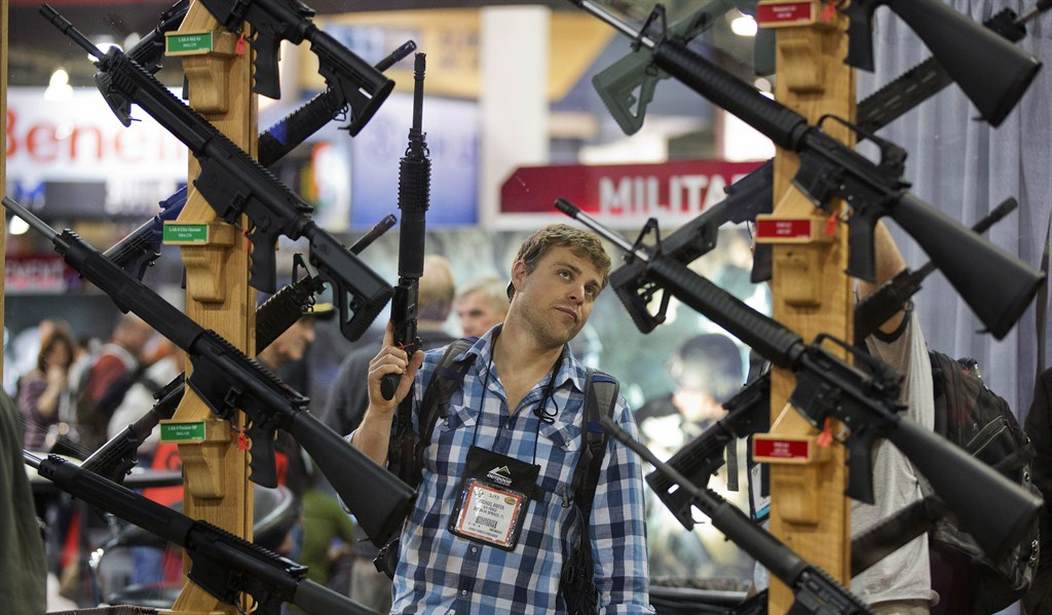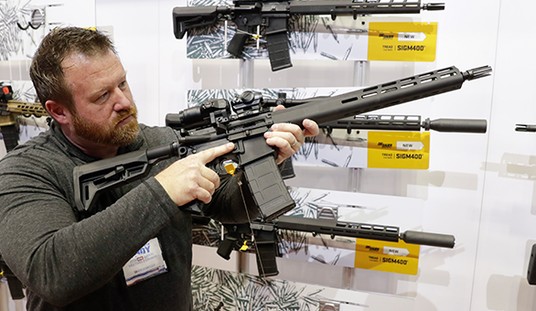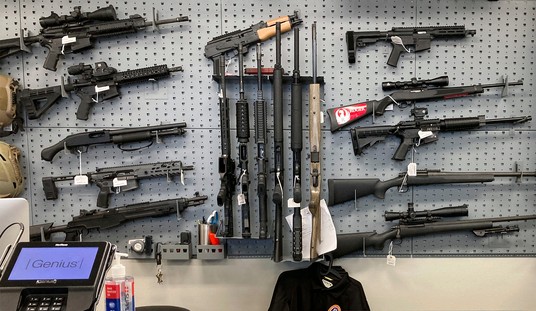And not just any law professor. Adam Winkler is a constitutional law professor at UCLA and one of the media’s go-to “experts” on the Second Amendment, because he’s usually quick with a quote about why “reasonable gun safety measures” shouldn’t be overturned by courts. The year before the Supreme Court overturned Washington, D.C.’s ban on handguns, for instance, Winkler argued in a law review article that strict scrutiny shouldn’t be applied to gun control laws, but even if that’s the legal standard adopted by courts, judges shouldn’t let that stand in the way of upholding almost every gun control law that faces a court challenge.
Winkler’s no fan of the “shall not be infringed” school of thought, in other words. But in a new column for the New York Times, Winkler warns his fellow gun control advocates that many of their fundamental policy goals may soon be taken off the table by the Supreme Court because of a challenge to New York’s carry laws that the court will consider in oral arguments this week.
The justices are considering the constitutionality of a New York law that makes it hard for residents to obtain a permit to carry concealed firearms in public. The court, with three conservative pro-gun justices appointed by former President Donald Trump, will almost certainly say New York’s law is too restrictive under the Second Amendment — which will lead, predictably, to more guns on city streets and more violent crime.
The New York case could also signal the beginning of a new era of judicial hostility to gun laws, especially to the bans on assault weapons and large-capacity magazines that the reinvigorated gun safety movement has fought so hard to get enacted. With a single decision, the Supreme Court majority could transform life in many American cities — and stymie the growing political movement for gun reform.
I’m not going to fisk every one of Winkler’s anti-Second Amendment bloviations, because I’m writing a blog post and not a book here, but let me quickly point out that almost 35 years after Florida adopted “shall issue” right to carry its violent crime and homicide rates had declined by more than 50%. In fact, violent crime steadily declined across the country from about 1991 until June of 2020, even as tens of millions of Americans obtained a concealed carry license.
As for the laughable idea that there’s a “growing political movement for gun reform,” I’d argue it’s the opposite. Recent polls have shown support for new gun control laws down sharply compared to recent years, but more broadly the gun control movement has steadily lost ground since its heyday in the 1970s and early 80s, when it successfully convinced lawmakers in both Washington, D.C. and Chicago, Illinois to ban the possession of handguns. That was the high water mark of the gun control lobby, though you could make a case that the 1994 national ban on so-called assault weapons and high capacity magazines that anti-gunners were able to foist on the American people with the help of Joe Biden was the real peak of the gun control movement.
Since then, however, the movement has stalled out nationally. And even at the state level Second Amendment advocates have been able to chalk up more wins than losses, though we’ve often had to fight like hell in the courts before we’ve been successful. Now, even anti-gun academics like Winkler are reluctantly coming to the conclusion that the Supreme Court’s decision in the Bruen case could spell disaster for gun ban fans.
Advocates and activists need an agenda that can survive the Supreme Court’s new interpretation of the Second Amendment. Fighting to restrict the quantity and kinds of guns owned by citizens will be a losing battle. Instead, it is time to focus on policies that will reduce the violence all those guns in America bring.
That’s a hell of an admission from Winkler, and I don’t expect to see the well-funded gun control organizations like Everytown for Gun Safety, Brady, and Giffords eagerly accept Winkler’s advice, at least not publicly. Behind the scenes, however, the deep-pocketed billionaires like Michael Bloomberg and Paul Allen who have helped keep the gun control lobby well-funded may be more amenable to accepting what Winker has to say; particularly since Winker’s not actually calling for a fundamental change in ideology. Instead, he’s largely arguing in favor of scaling back the gun control lobby’s agenda.
A good place to start would be community-based intervention programs like Operation Ceasefire, an initiative launched in Boston in 1996. Studies show that a small percentage of the population, such as gang members and hardened criminals, commit a disproportionate amount of violent crime. By bringing together community leaders, former gang members and the police for outreach to those most likely to use firearms, gun violence intervention programs have a proven track record of reducing gun crime.
Such programs, however, require resources and personnel at a time when social services and law enforcement are already stretched thin, and the political will to fund them adequately has never really materialized. That’s where the new strength of the gun safety movement can be a boon. Instead of spending political capital on a national ban on assault rifles that the justices are likely to overturn, the movement could use its muscle to push for federal and state legislation to fund vibrant and effective gun violence intervention programs in every major and midsize city across America.
This is an area where gun owners and gun control activists really can find common ground. In fact, I’ve been writing about Operation Ceasefire for years now, and it really is an effective way to target those most likely to commit and be victimized by “gun violence” without the need for new laws. In fact, I would argue that these programs don’t even really need a ton of money thrown at them to make them work. The most important factor is in actually following through with the promise of help for those who stop shooting voluntarily, and severe legal consequences for those who don’t.
That’s where the common ground stops, unfortunately, as Winkler follows up that good idea with a couple of bad ones.
By law, A.T.F. is prohibited from using electronic databases to trace guns found at crime scenes and barred from electronically searching the records it does have. So when a gun is found at a crime scene, agents have to travel to individual gun stores and sort through boxes of documents to find out who bought it. A.T.F. is also prohibited by law from making more than one unannounced, warrantless inspection per year of any licensedgun dealer. And A.T.F. is still operating with roughly the same number of employees it had in 2001, and about 20 percent fewer inspectors, even though the number of guns in the United States has skyrocketed, and we now average at least 30 million gun sales a year. In a country where there are now more licensedgun dealers than branches of Starbucks and McDonald’s combined, these artificial restraints on A.T.F. should be lifted.
The gun safety movement should also launch a renewed push for universal — and better — background checks to make it harder for criminals and abusers to obtain firearms. There is broad public support for universal background checks, even among gun owners, and the court is unlikely to declare them unconstitutional.
What Winkler is really calling for here is a national gun registration scheme, replete with federal penalties for non-compliance. It’s possible (though I think unlikely) that the current makeup of the Supreme Court would actually go along with that, but I know that there aren’t 60 senators willing to do the same. Most importantly, there are also tens of millions of gun owners who would undoubtably not comply with any such demand on the part of the federal government. Winkler even admits as much when he discusses the lack of results even when gun control activists have managed to put a gun or magazine ban in place.
An agenda that focuses on intervention, beefing up gun law enforcement, and better background checks would not only be more likely to survive in the court, it might also do more to reduce gun violence. While assault rifles look menacing, they are responsible for only a fraction of gun deaths in America each year. While these weapons have been used in some of the most notorious massacres, most mass shootings are actually committed with handguns.
The same principle applies to large-capacity magazine bans. Though good in theory, they’re consistently ignored in practice. Advocates convinced lawmakers in New Jersey to ban them in 2018, but there doesn’t seem to be any evidence that gun owners have turned in or thrown away their now illegal magazines.
Honestly, I think Winkler’s being a little too pessimistic here, though I would love to believe that our biggest 2A fights may soon be over if we get a strong ruling in the Bruen case. After all, it’s been more than a decade since the Heller and McDonald decisions, and while the gun laws have definitely gotten better in D.C. and Illinois since the Supreme Court last weighed in on the right to keep and bear arms, both state and local governments continue to place severe burdens on the Second Amendment rights of residents when it comes to possessing guns in the home or carrying them in public for self-defense.
If forced to retreat once again, I think gun control activists are likely to regroup not only around things like universal background checks, but also an end to statewide firearm preemption laws, zoning restrictions designed to make it impossible for gun ranges and gun stores to operate in practice if not in theory, as well as continued litigation efforts meant to bankrupt the industry by holding it responsible for the actions of criminals.
I’m definitely hoping for a powerful and precedent-setting decision in favor of the right to bear arms by the Court, but even if may-issue laws like New York’s are struck down and the SCOTUS declares that the history, text, and tradition of the Second Amendment takes other things like gun and magazine bans off the table, I don’t think the gun control lobby is going to curtail its quest to make it as difficult as possible for the average American to exercise their constitutionally protect right to keep and bear arms.








